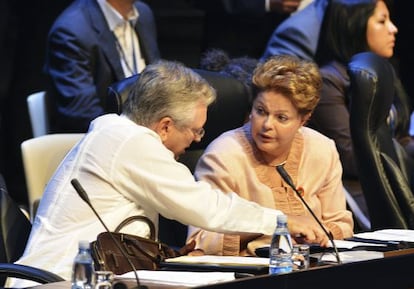Brazil studies possible trade sanctions against US over new farm bill
Legislation passed by Washington will continue to offer aid to American cotton growers

Just when the United States is trying to iron out its diplomatic problems with Brazil following last year’s spying allegations, a new farm bill passed by Washington lawmakers last week could place bilateral relations under fresh strain.
In 2004, the World Trade Organization ruled in favor of Brazil in a dispute over US government subsidies given to its cotton growers. The Brazilian government argued that it put its own growers at a disadvantage while altering fair global trade.
Nevertheless, Brasilia agreed with Washington that it would not impose any sanctions if the US government compensated Brazilian cotton growers until new US legislation could be passed that would eliminate subsidies to cotton farmers.
The aid, which commenced in 2010 and totaled some $147 million annually, was cut off during the budget impasse last October between Republican lawmakers on Capitol Hill and President Obama, which led to a two-week government shutdown. In response, Brazil announced that it would be adopting a decision before March based on the “hypothetical scenarios” that could unfold.
The new US farm legislation establishes a new system of indirect subsidies.
During his visit to Washington at the end of last month, Brazilian Foreign Minister Luiz Alberto Figueiredo warned Obama administration officials that his government would carefully study the new law when it is passed to weigh up whether it responded to Brazil’s “requirements.” From there, the foreign minister said it would make a decision on whether or not to impose retaliatory sanctions against the United States.
The moment of truth has now come. The new legislation eliminates direct subsidies to cotton producers – as Brazil had demanded and with which Washington officials believe they will satisfy the WTO – but in exchange it establishes a new system of indirect subsidies, which may not please President Dilma Rousseff.
Under this new legal framework, cotton producers can opt to purchase insurance that guarantees them a set minimum of revenues for the next few years. But the essential hitch here is that the US government offers to finance up to 80 percent of the insurance payment if they decide to purchase it.
“It is supposed to be an incentive for the producer to purchase this protection, which should encourage them to grow more cotton,” said Burleigh Leonador, a senior analyst at the Washington-based Prime Policy Group,
The trade balance is also threatened. According to the OECD and FAO, the United States is the world’s third-largest cotton producer after China and India; Brazil ranks fifth. At the same time, the United States is the largest exporter of cotton while China is the largest importer.
Brazilian officials will now have to study where this new farm legislation leaves them. Washington is still trying to patch up ties following last year’s revelations by wanted former intelligence contractor Edward J. Snowden that the United States tapped Rousseff’s personal cellphone and monitored the communications of tens of thousands of Brazilians over the past several years. Rousseff was so upset that she canceled a planned official visit to the White House in late October.
In 2010, Brazil released a list of hundreds of American imports that could be the targets of retaliatory trade sanctions. They include US autos, which would have to pay a 50-percent import duty over the current 30 percent; wheat, which will go up to 30 from 10 percent; and cotton, which will have to pay a whopping 100-percent tariff.
Tu suscripción se está usando en otro dispositivo
¿Quieres añadir otro usuario a tu suscripción?
Si continúas leyendo en este dispositivo, no se podrá leer en el otro.
FlechaTu suscripción se está usando en otro dispositivo y solo puedes acceder a EL PAÍS desde un dispositivo a la vez.
Si quieres compartir tu cuenta, cambia tu suscripción a la modalidad Premium, así podrás añadir otro usuario. Cada uno accederá con su propia cuenta de email, lo que os permitirá personalizar vuestra experiencia en EL PAÍS.
¿Tienes una suscripción de empresa? Accede aquí para contratar más cuentas.
En el caso de no saber quién está usando tu cuenta, te recomendamos cambiar tu contraseña aquí.
Si decides continuar compartiendo tu cuenta, este mensaje se mostrará en tu dispositivo y en el de la otra persona que está usando tu cuenta de forma indefinida, afectando a tu experiencia de lectura. Puedes consultar aquí los términos y condiciones de la suscripción digital.








































